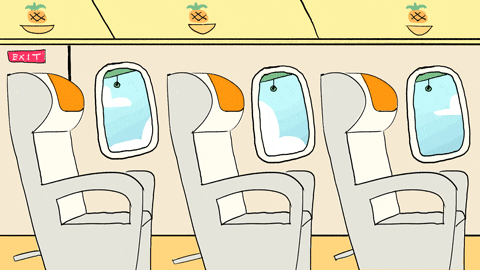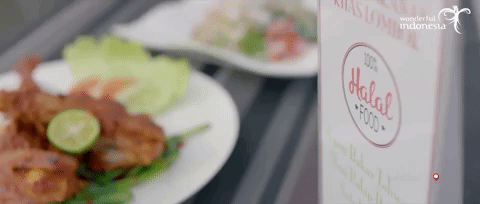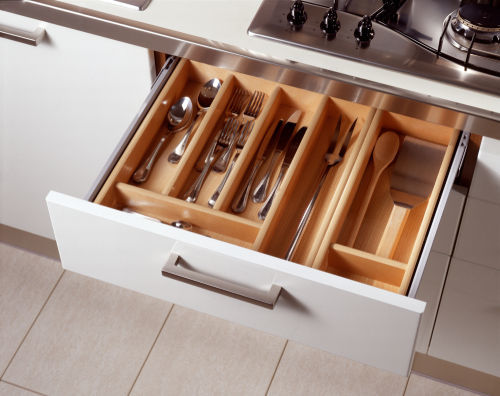The ultimate travel guide for Muslims
This article was first published on May 2023 and has since been updated as of 17 November 2025.
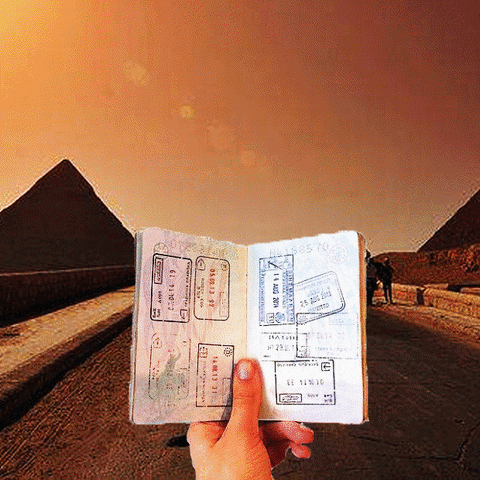
Praise be to Allah.
As Muslim travellers, we have to plan ahead so that we can happily travel without dampening our mood, from getting halal food to performing our prayers in places with possibly limited spaces and different time zones. These factors can contribute to either a smooth adventure or a challenging one depending on our own preparations.
Alhamdulillah, one of the beauties of Islam is the fact that it provides alternatives that ease all our obligatory duties. Islam alleviates difficulties while preserving our well-being. Allah s.w.t. mentions in The Quran,
يُرِيدُ اللَّهُ بِكُمُ الْيُسْرَ وَلَا يُرِيدُ بِكُمُ الْعُسْرَ
“Allah intends for you ease and does not intend for you hardship.”
Don't worry! Here are some helpful hacks that we have prepared for you to ensure your travel will be hassle-free.
Guide to prayer while travelling
As Muslim travellers, while we are enjoying our vacation, our prayers should still be our topmost priority. Praying is the most basic form of showing gratitude to our Creator, who has granted us the wealth, time and health to travel.
Wherever we are, whether we are moving or settled at a place, we should never miss our prayers. As reported by Ibnu Umar r.a, the Prophet s.a.w. was asked about praying on a sailing ship, to which he answered:
صَلِّ فيها قائمًا إلَّا أن تخافَ الغرقَ
"Perform your prayers onboard it (in a standing position), unless you fear sinking / drowning".
(Mustadrak Al-Hakim)
Travel can be challenging, even when all our needs are met. It is Allah's mercy and wisdom that allows us ease in our travels. Let us look at some common questions about our religious practices during travel!
When can we combine and shorten our prayers?
Image credit: Giphy
Combining and shortening prayers are defined by the terms; jama and qasar, respectively. Combining and shortening prayers in travel are concessions that Allah s.w.t has granted us.
Jama prayer means combining two different fardhu (obligatory) prayers at one time, either by performing it in the timing of the first prayer (taqdim) or the second prayer (ta'khir). Zohor can only be combined with Asar prayer and vice versa, while Maghrib can only be combined with Isyak prayer and vice versa.
Qasar prayer means shortening the number of rakaat prayers, particularly from 4 rakaat to 2 rakaat prayers.
The following are the conditions to be fulfilled in performing the jama qasar prayers:
1. Qasar prayers can only be performed when the travel distance is beyond 2 marhala. Scholars vary on the actual distance of '2 marhala' in the measurement of kilometres. Generally, it is understood to be between 82-89 km. Any travel destination that which exceeds the '2 marhala' mark is termed as a 'long travel'.
2. The jama or combination of the first and the second prayers must be performed together without intervals, such that the second prayer must be performed immediately after the first prayer, as according to the major view in the Syafi'i mazhab (school of legal thought).
3. If the jama prayer is intended to be performed in the timing of the second prayer, the intention (niyyah) to perform the jama must be made in the timing of the first prayer. For example, if the jama of Zohor and Asar prayers are to be performed in the timing of the Asar prayer, the intention must be made in the timing of the Zohor prayer, before the call of the Asar prayer.
The number of days for the concession, according to Syafi'i mazhab, is five days. The five days include the day of arrival (1 day) and day of departure (1 day). However, there are other views that allow the extension of more than three days, excluding the day of arrival and the day of departure.
How to know when it’s time to pray on a plane?
It is very important for you to plan and know when you will be travelling and the prayer time during your journey to the destination. Always plan your prayers beforehand, especially when you are taking a long-haul flight. By planning, you can roughly prepare alternatives and ways to ease your prayer.
For those who will be travelling by plane, it’s time for you to use your phone to the fullest. There are so many mobile travel apps that can help you to know when you’re supposed to pray by simply include the time and place where you will be departing and your arrival destination.
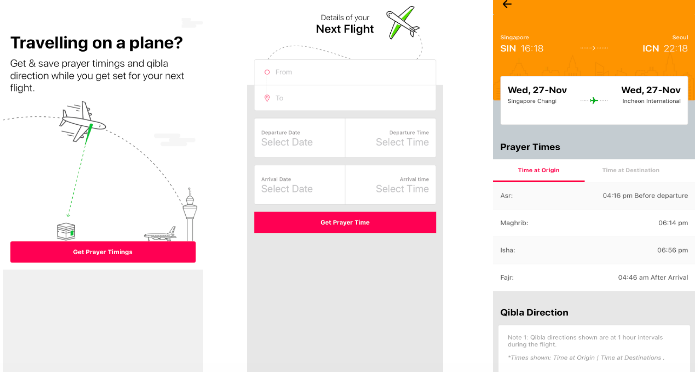
Some of these apps provide the approximate prayer time depending on your departure and arrival timing. You may use the in-flight information screen to double-check the timing that the application provides.
However, if you do not have any access to in-flight entertainment as well as the application, you can always try to observe the sun path.
Here’s a graphic which can help you to determine the prayer time:
Image credit: MUIS ADIL Traveller’s Fiqh Module
But do note that once you have arrived at the destination, you should follow the prayer timing of that country throughout your stay there.
How do we pray in a moving vehicle?
Image credit: Giphy
When travelling by car, we would have the opportunity to stop at the Rest and Recreation (R&R) pit stops along the highways. However, we may not have the same opportunities when travelling by plane or train and will eventually need to perform our prayers on the flight itself.
Before we start to perform our prayer, we have to take wudhu’ (ablution) as per the rule. Since water is accessible in flight, we do not need to perform the tayammum. Most importantly, do not waste water while performing your ablution and ensure that the toilet area is clean after you use it!
Scholars agree that we should perform the five fardhu (obligatory) prayers by fulfilling all the movement integrals (arkan fi'li) the best we can, which includes standing whilst facing the qiblah. This can be difficult because of the limited space available on a plane or train. Due to the dire circumstances and safety purposes, you may opt to face the qiblah (prayer direction) only during the ‘takbiratul ihram’ and continue performing your prayer facing any direction afterwards whilst sitting.
Read: How to pray when you are travelling on a plane
If all efforts fail to determine the location of the qiblah, one is permitted to face the most precise direction to do your prayer. ‘Imran Bin Husain r.a. narrated that the Prophet s.a.w. said to him:
“Pray while standing and if you can’t, pray while sitting and you cannot do even that, then pray lying on your side."
(Sahih Al-Bukhari)
While some planes in recent times offer a place to perform solat, this is not the case for most available airlines. According to the Syafi'i mazhab, if one is unable to perform the fardhu prayer whilst facing the qiblah, it is obligatory to perform the fardhu prayer according to the circumstances, in respect of the prayer time, and to therefore fulfill the complete fardhu prayer (qadha), after arriving at the destination.
Guide to finding food overseas
Image credit: Giphy
One of the most common challenges that we face as Muslim travellers is to find halal food overseas. There is no problem for us in Singapore, as we have established halal certification from MUIS. But this is not usually the case, especially when we're travelling to a non-Muslim majority country - “Where and how can we find Halal food?”. Here are some tips for your frequently asked questions.
Read: Common Questions About Halal and Halal Certification In Singapore
When you travel, always research the Halal or Muslim-owned restaurants around the places you intend to visit or stay beforehand. However, when there are no halal restaurants available in the area, non-halal certified restaurants will be the next option. You can consider the following tips:
1. Check if they have halal meat options (some restaurants may have that option, despite serving alcoholic beverages)
2. Choose either seafood or vegetarian/vegan options.
3. Request to have no alcohol in the food you choose (for seafood or vegetarian)
Read: What is Halal?
Regardless of which option you opt for, you should double-check with the restaurant on the ingredients of the food before you purchase. In some countries, generally, they will be more than delighted to share the ingredients with you!
When choosing food, it depends on personal discretion and choices. Thus, whatever standards you choose should not be imposed on others.
Guide to using the utensils at your accommodation
Aside from hotels, Airbnb is an accommodation alternative when overseas, and it has become a trend to book for a shared accommodation where you share the main facilities with others. We always have doubts, especially when using the kitchen equipment and utensils provided to us. “Should we do ritual cleaning, sertu before using it?”. There are a few things that you can look out for.
You can use a shared fridge or microwave. You can ensure that there is no direct contact between your food with the non-halal food by placing your food properly wrapped or sealed in food containers in the fridge.
You can still use the utensils provided. Just make sure that it is clean. According to Imam An-Nawawi, there is no need for you to do ritual cleansing (sertu) if you are confident with the cleanliness of the utensils. However, if you are not comfortable with that option, you may wish to bring the sertu soap. It is so easy now that you can find it at selected supermarkets in Singapore! Read the Contemporary Irsyad Series for a more detailed explanation!
If you would like to know more about the fiqh of travelling, do sign up for the ‘Traveller’s Fiqh course' by ADIL SG. It’s free! Now, you are ready and set to go! Hope that these guides help you and ensure your travel will be a hassle-free experience.
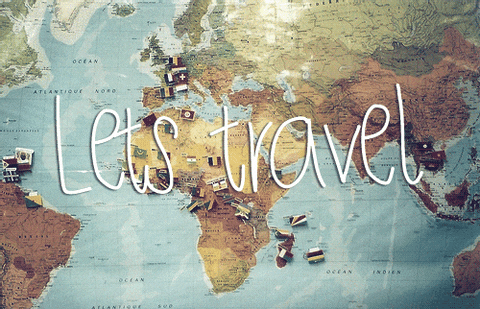
Happy travelling!
And Allah knows best.
Articles on Muslim.Sg may be reproduced electronically or in print with prior permission from Muslim.Sg. Proper credit must be given to the author(s) and Muslim.Sg.



